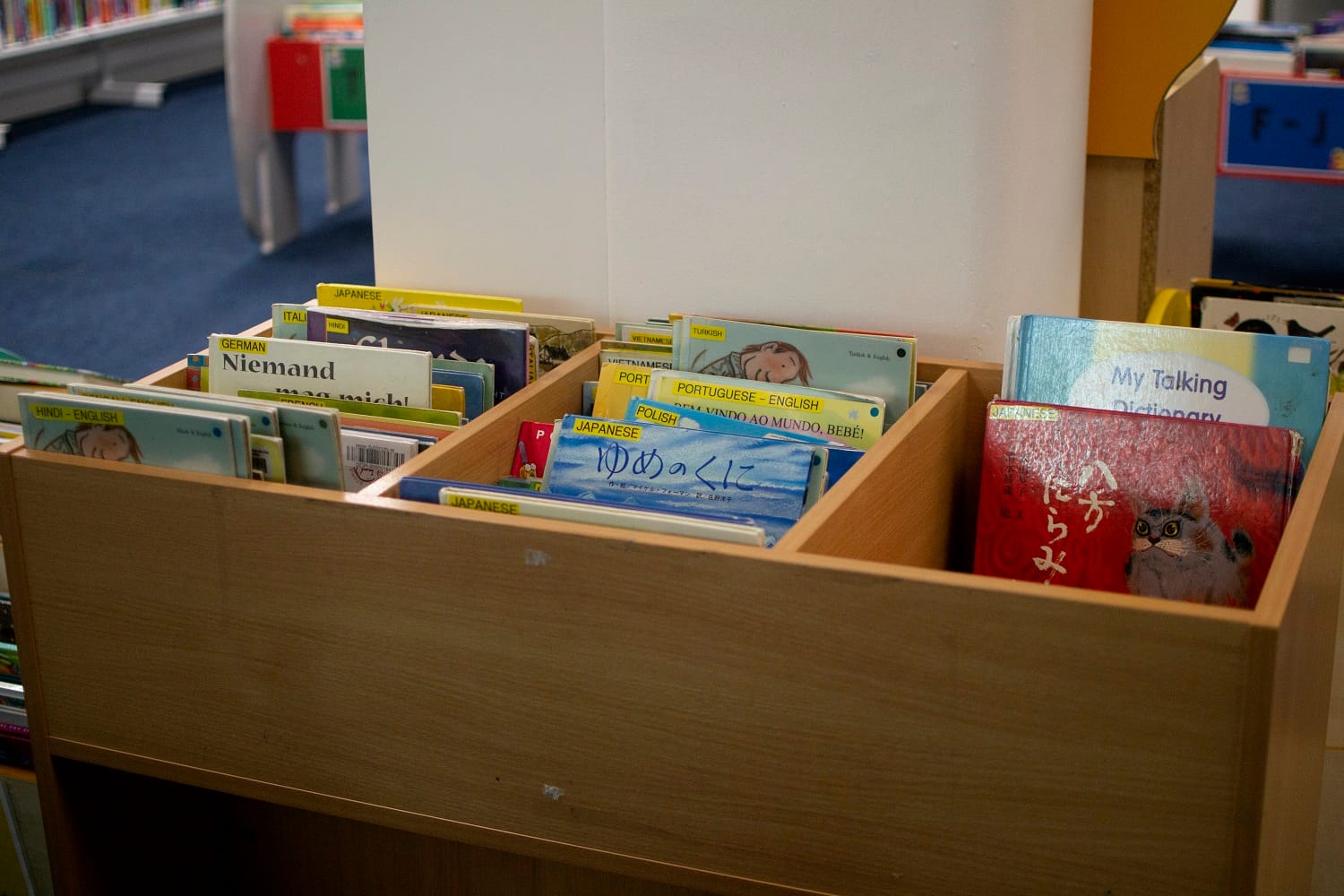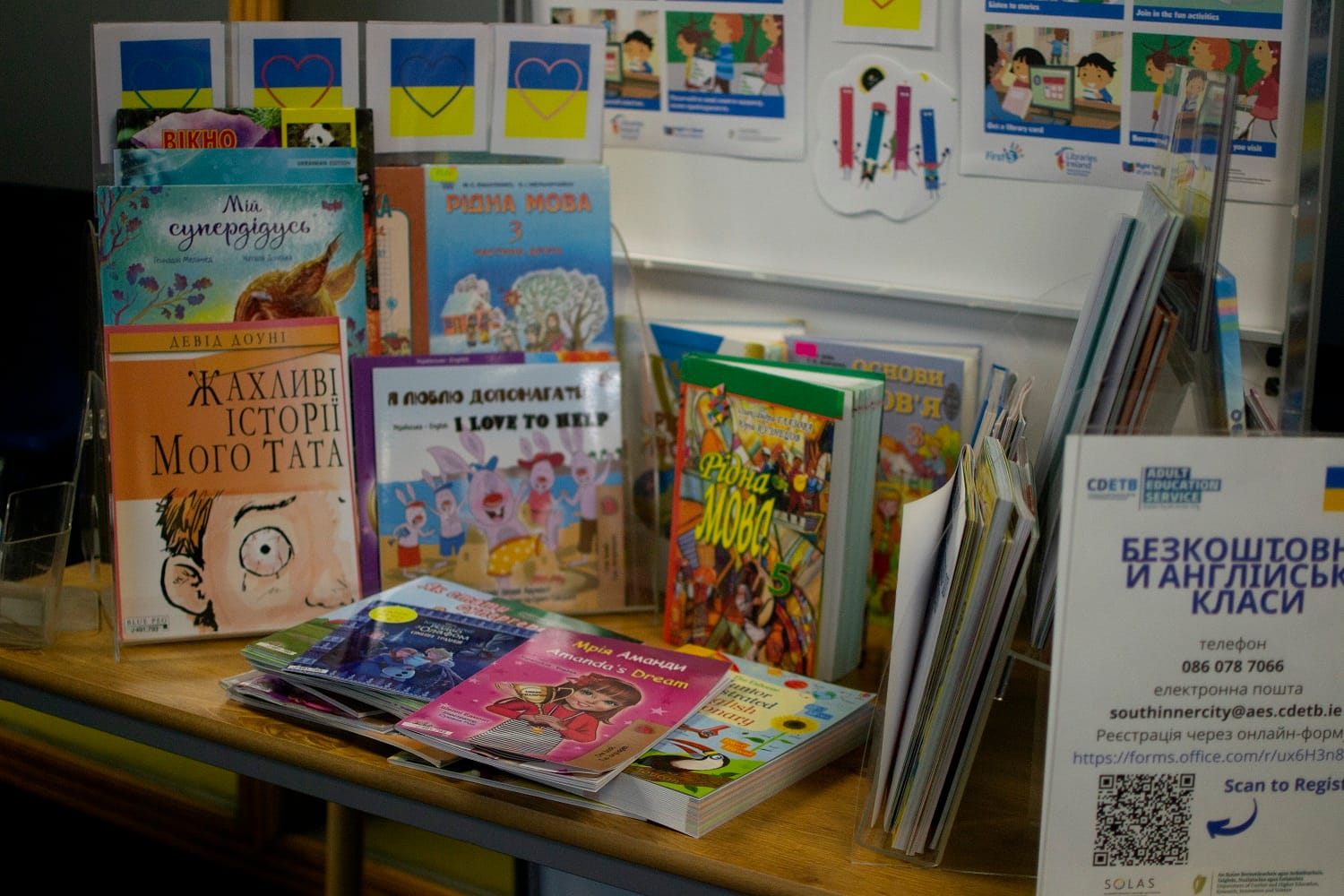What’s the best way to tell area residents about plans for a new asylum shelter nearby?
The government should tell communities directly about plans for new asylum shelters, some activists and politicians say.
But some 18 percent of people living in Dublin reported speaking a language other than English or Irish at home, in the 2016 Census.

Arjumand Younus says she has given up on a search for good books in Urdu for her small daughters. “I couldn’t find much, neither on Amazon nor here in the libraries,” said Younus on a Zoom call recently.
She has tried to get them to speak Urdu at home to keep their knowledge of the language alive. But every time they struggled with the tongue, Younus relented and let them talk in English, she says. “We should’ve had a stricter rule.”
These days, her kids sometimes watch cartoons in Urdu on YouTube, but that’s far from the world of Urdu stories that their mum grew up in.
“When I was growing up, we had these lovely Urdu magazines that we had subscribed to, and they would come to our house every two months,” says Younus.
All of the city’s libraries have children’s picture books in different languages, says Dublin City Council’s website, but the details of how many it has in which languages are harder to come by. A spokesperson for Dublin City Council hasn’t yet replied to queries about that.
Dubliners speak dozens of languages at home, according to the 2016 census: 96,695 of the 535,806 people (18%) “usually resident and present” in Dublin city then reported speaking a language other than English or Irish at home, according to the Central Statistics Office.
That included 1,526 who spoke Urdu – although the most commonly spoken were Polish (10,953), Romanian (9,286), Spanish (8,694), French (8,422) and Portuguese (8,297).
But there is little information to guide them to places where they can buy or borrow books for their kids in these languages. It’s also unclear how libraries decide on what books to buy and in what languages.
On Monday, in book stands at the Central Library at the ILAC shopping centre, there were no Urdu-language books among its dual-language storybooks for young children. A few were in Hindi, Bengali, Mandarin, Japanese and Arabic.
But on the shelves at the back of the kids’ library, its small collection of books for older kids mainly included books in European languages, like Icelandic, Polish and Lithuanian.
A search on the online catalogue of the libraries finds few story books for children in non-European languages. It finds a handful in Arabic and in Urdu, for example. Albeit, it gives roughly 90 titles in Ukrainian.
The city’s libraries have some online resources in other languages for kids too. It says they have 800 book titles available in over 30 languages, some of them tongues spoken outside of Europe.
Fiona Shortt, children’s librarian at the Central Library, says their books for older children are hardly ever borrowed and, besides parents looking for dual-language Mandarin books for their kids, there is little demand for others.
Perhaps, Shortt says, because they don’t advertise what they have, or let people know they can request more. “I don’t know if people realise that, but we do take purchase suggestions.”
In March, Dublin City Council put up a blog post about the library resources available for Ukrainian refugees arriving in Ireland.
“At the moment, we’re trying to source and to buy Ukrainian-language books for all age groups, from children to adult,” it says. Others in the city have also been trying to fill that void.
On Sunday in Artane, inside a cosy shed in the backyard of Edel Finn’s parents’ home, were heaps of boxes full of hardcover children’s storybooks in Ukrainian.
Finn bought more than 700 of them for kids transplanted to Ireland because of the war, she said on Sunday, sitting opposite the boxes and holding a mug of coffee.
Her two small kids can’t get enough of books, Finn says, and when she was growing up, she found shelter in their world of make-believe whenever something bothered her.
“I was thinking about the comfort that a book can bring to a child,” she said.
In May, Finn set up a GoFundMe page to crowdfund the books’ costs. To date, it has raised a little over €3,000.
The Ukrainian Crisis Centre Ireland helped her get the books from Lviv to Dublin, she says.
While Fundacja Powszechnego Czytania, a Polish foundation that is involved in securing books for displaced Ukrainian kids in Poland, helped Finn buy them from Ukrainian publishers, she says.
During the Second World War, Polish books and libraries were decimated, the country’s publishing industry was all but destroyed, and literacy rates fell, says the GoFundMe page.
Fundacja Powszechnego Czytania wants to keep that from happening in Ukraine, so buying books from Ukrainian publishers is a way to try to ensure the survival of the publishing industry there, it says.
Most of the books that Finn has bought haven’t been dispersed yet. “It’s very difficult when you’re doing this individually,” she says.
She only has time to focus on the project on weekends, she says. “So, this weekend, I’ve been focused on getting my bundles of books to the different libraries.”

She’s unsure if she can turn up at Citywest hotel, where some Ukrainian families stay, with a delivery of books, she says.
“I’ve emailed IPAS [International Protection Accommodation Services] in relation to Citywest,” says Finn. The government agency hasn’t responded yet, though, she says.
On Monday, at the library in the Ilac shopping centre, a display of Ukrainian children’s books welcomes visitors into its section for kids.
The welcome sign is adorned by about a dozen small Ukrainian flags and a heart.
Shortt, the children’s librarian, says some Ukrainian refugees have come by to borrow English-language books to help their children fit in.
Others have asked for Russian-language books for older children, which they don’t currently have. “So I emailed readers’ services again and said, ‘Can you buy a mix of both?’” she says.
Finn, whose collection includes a variety of books for teens and younger children, doesn’t have any Russian-language books either.
“I intentionally went with Ukrainian language only to support the promotion of Ukrainian language and culture and also Ukrainian authors,” she said.
Finn says she wonders why the need for storybooks isn’t something that readily comes to mind when people think about migrant kids, regardless of their nationalities.
Books in their first languages keep the door of a soothing familiar world open whenever they need an escape from their new lives, she says. “They should have access to something they can just disappear into.”
Some books also address the unique traumas refugee or asylum-seeking children face and help them process darker realities.
Finn picks up a book from one of the boxes. It’s a child’s guide to navigating the war with illustrations of tanks and airplanes.
She was fascinated, Finn says, by the dark places some Ukrainian writers went to and their refusal to candy-coat the world for children.

As of 18 September, a little over 3,300 children live in IPAS accommodation centres, said a spokesperson for the Department of Children and Equality.
They said that families have access to local libraries. And “libraries and members of the public donate books for adults and children to centres”.
A spokesperson for Children’s Books Ireland, a nonprofit advocating for young people’s right to read, said it had gifted hundreds of books to direct provision centres.
“However, these have, so far, been in English,” they said.
But they’re launching a new guide with a focus on wordless books called Picture This! on Wednesday, which features a list of recommended text-free books for kids, they said.
“With the hope that children who experience difficulties reading or face language barriers can still enjoy brilliant and engaging books,” the spokesperson said.
As part of that, they are gifting visual books to schools that have enrolled Ukrainian students, they said.
Finn and Younus, the mother looking for Urdu-language books, both say buying children’s books from non-European publishers would cost very little.
But at the moment, there is little information about where parents can get books in different languages, she says.
Not everyone knows what resources even exist in libraries, she says. “They can let people know in different ways.”
Get our latest headlines in one of them, and recommendations for things to do in Dublin in the other.